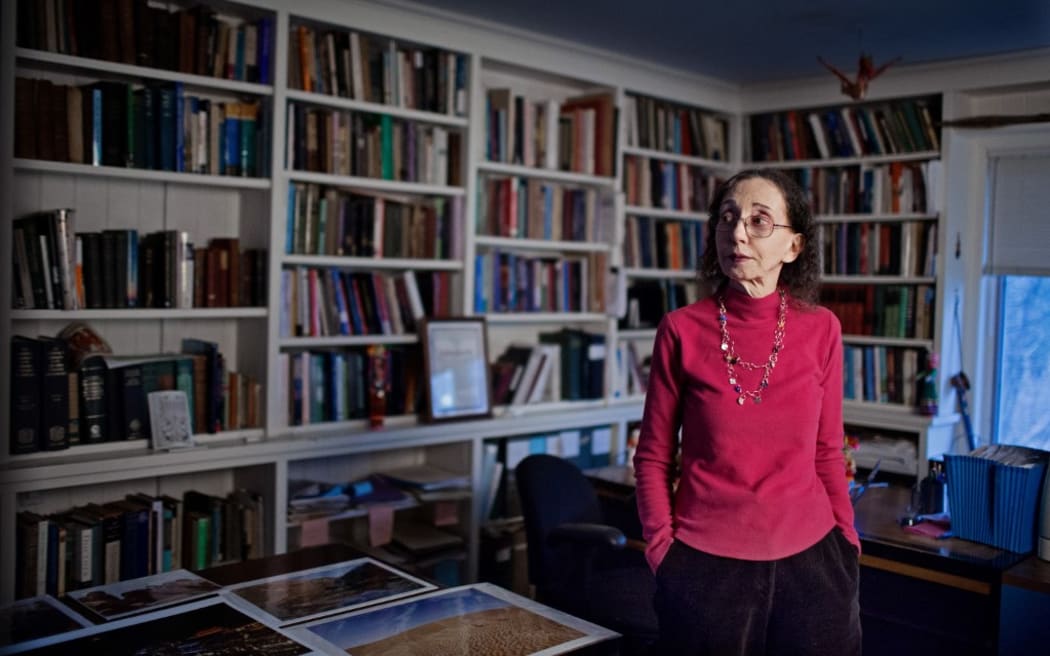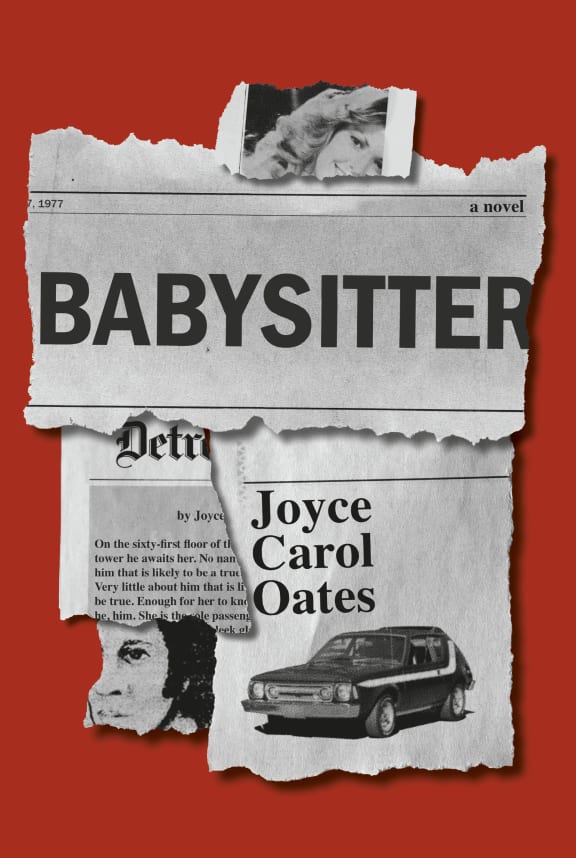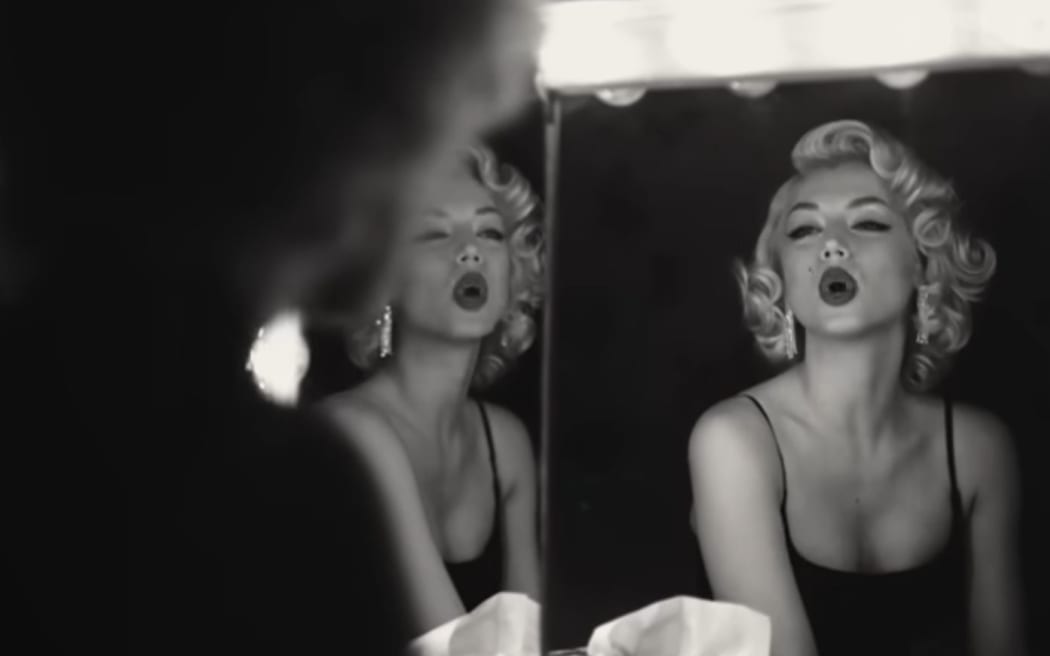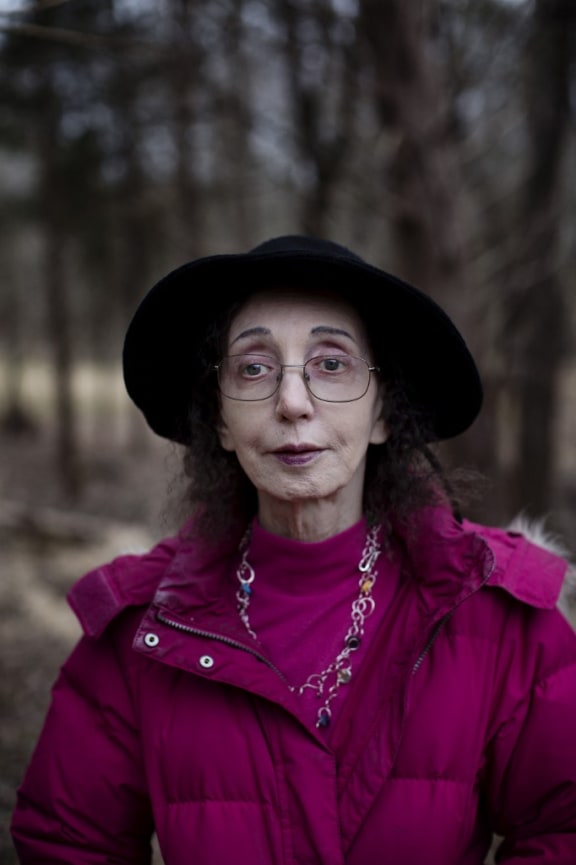Aged 84, and one of America’s most renowned authors Joyce Carol Oates still knows how to strike a nerve.
The film adaptation of her 2000 novel Blonde - a fictionalised account of the life of Marilyn Monroe and what she described as “the most difficult novel” she has written - is polarising viewers on Netflix.
Meanwhile, her latest novel Babysitter is, as the Guardian says, unflinching in its detailing of sexual assault before the #MeToo era.
Babysitter is inspired by a serial killer who murdered children in the 1970s in the suburbs of Detroit, where Oates lived at the time.

Photo: PONTUS HOOK
KH: I do want to talk about Babysitter because I'm still reeling from it. I've only just finished it. And we'll talk about that in due course.
But I want to talk about Blonde, and the adaptation of, which I've also just watched. You had to take a break from it, because you found it so gruelling?
JCO: I did. It actually took me three times before I could see the movie all the way through.
KH: Do you think that the book was less gruelling than the movie?
JCO: Well, that's a good question. I think there's something about the visual images which are in front of our eyes.
And seeing an actual person, who in this case was a really, really excellent actress performing as Marilyn Monroe, we have a visceral and emotional connection that is different from the more cerebral experience of reading.
KH: And it's easier to take a break when you're reading than in a movie.
JCO: Yes, exactly. You could always turn the page, let's say in a book or close the book, whereas if you're watching a movie, you're sort of spellbound. Somewhat hypnotised is how I felt.
KH: Andrew Dominik's adaptation has been somewhat controversial. Do you understand why?
JCO: Well, I think if a woman had made the film, it might have been recognised as a feminist film, detailing the tragic ways in which women are victimised by men.
But because he's a man, obviously, there wasn't that sympathy for what he was trying to do. I think he was presenting a feminist experience, an extreme experience, of a kind that many women have at the hands of men. I believe that's what he was trying to do.
Now, I don't know Andrew Dominik, I've never met him and I've never done a Zoom or Skype with him, but I've spoken with him on the telephone twice.
So, I don't know him. But he's very serious. And I think that he felt he was presenting a very sincere, empathetic portrait of Marilyn Monroe.
But other people looked at it and saw something different.
KH: I think what worried some people was the lack of agency that he gave her - do you think?
JCO: In her own life, ultimately, she didn't have much agency. People think that a beautiful woman has a good deal of power.
But in the case of Marilyn Monroe, she really didn't have much autonomy. She didn't make much money. She was always trying, she was always taking courses, she was very insecure.
She may have been very, very famous and very beautiful in the eyes of her fans, but when it came to the real world of power and patriarchal power, she was not very important.
For instance, to John Kennedy, she didn't mean much to him. That was pretty evident, the Kennedys treated her very indifferently and disrespectfully.
Talking about the Kennedy scene in the film Blonde.
KH: It's a terrible scene. I did have trouble watching it.
JCO: Yes and whether these things really happen in life or not. We don't necessarily want to see them. And I think that's why people recoiled.
It's like murder scenes in movies. I don't really want to see them either.
KH: But you don’t mind writing about them?
JCO: Well prose is somehow different.
KH: This is a trite question, but you’ve thought about it, you’ve written about it. Can you explain to me why you are so drawn to violence?
JCO: Well, I'm mostly writing about the aftermath of violence, and on the lives of girls and women and how people deal with that.
I don't usually write about violence per se. I mean, I've written a lot of books, and I've written a lot of short stories, and sometimes a girl or a woman has an experience that's difficult, but I usually focus on how they move on.
KH: So diverse is your writing, I'm conscious of cherry picking and misrepresenting you, so please excuse me, but there is Blonde, there is your latest novel Babysitter. And there is possibly your most famous short story Where are you going? Where have you been? And they all have something in common, which is relentless male violence.
JCO: There was absolutely no violence at all in Where are you going? Where have you been? Where's the violence in Blonde?
KH: The psychic violence if you like?
JCO: Well, now that's quite different. I mean, ordinary life is filled with psychic violence, in ordinary households, people are cruel to their children or to one another, we don't really call that violence.
I mean, what is the writer supposed to write about? Happy problems, happy people?
It was always said that women are supposed to write about domestic things like babies and men are supposed to read about war and action, Well, I don't feel that's true. Women should write about the same things that men write about.
KH: Is it true that the novelist John Gardner, who was a friend of yours, suggested you try writing a story in which things go well for a change?
JCO: He said I should write something that his daughter, who was about 10 years old, would not be upset by. That's kind of silly. I mean, we write about everything.
Women can take photographs of anything. I mean, there was a woman photographer who was taking photographs of Auschwitz. When men take photographs of profound subjects nobody thinks it's strange. But when a woman does what men do, it's somehow held up to question.
KH: In Babysitter, there is some redemption. I don't want to go into it any further because it would be a spoiler. But maybe that's as close to happy as we get?

Photo: Penguin Random House
JCO: Well, I'm not trying to write happy novels, I'm writing about a serial killer who lived in the Detroit area. It was a real case.
Are you suggesting people should not write about anything upsetting either fiction or nonfiction? Or is it just women?
KH: How would you interpret what I'm talking about as a suggestion that you should write about something different?
JCO: Well, you just said, you were just bringing up the subject of John Gardner, that I should write something cheerful.
KH: I asked you if it was true that was what he had suggested. I found your response interesting.
JCO: He himself was writing very serious, tragic work. He thought I should write something that his young daughter would not be upset by.
But he was drinking at the time. I mean, we spent a lot of time together, he would be drunk. I mean, a lot of what he said was playful, you know, more playful.
I don't think he meant that to be profound.
You wouldn't say to Tolstoy, he should write something cheerful for somebody's daughter. I mean, it was meant to be a joke …perhaps.
KH: You've said that Babysitter was inspired by a serial killer in the Detroit area. Similarly, Where are you going? Where have you been? was also inspired by a killer. I don't know whether it was a serial killer, who was that?
JCO: Yes in Tucson, Arizona. Yes … but in the story itself, there isn't any killing? We don't know that he's killed anyone really.
KH: And we don't know whether she's dreaming or not?
JCO: Well, you could say that of any work of fiction. But obviously, what's the point of writing a dream? I wouldn't have done that, there’s no way that a writer would just have a whole story that was a dream.
KH: And you say no violence, but the impending feeling of threat and fear is so great that it's almost worse than any act of violence. Do you think?
JCO: Am I the only one who writes about these subjects?
KH: I don't know why you're so defensive. I'm not criticising you in any way about anything you have written. I am merely asking about what you've written?
JCO: Well, the focus seems to be on that there's something abhorrent in my writing about America as it is. I mean America is a certain place and I lived in Detroit and you know, I've lived here for a long time.
I’m just holding a mirror up to American society. It's what I've been doing.
I don't feel from my own perspective, that it needs any explanation. Stendhal said that a novel’s a mirror moving along a highway. It reflects what's in the society. It's not made up by the novelists. I mean, the subject matter’s out there in the world.
KH: I was thinking about the protagonist, Hannah, in Babysitter, and also about Marilyn Monroe when Hannah says, ‘If a woman is not desired, a woman does not exist’. And elsewhere, ‘the curse of the female to so badly need love’. Do you think that's always been the case? I mean that's a theme of so many novels.
JCO: Well, it's the case with some characters and some people in the world. It's not the case with a woman who has more of a substantial identity or profession, or maybe a woman who has a good deal of money.
Marilyn Monroe was financially very insecure. Maybe if she'd made more money, she might have retired or gone to live in New York City and acted in the theatre, she would have had a different experience.

Photo: screenshot
KH: Hannah in Babysitter has plenty of money. She's beautiful, expensive clothes, she is living the dream. But it doesn't stop her being afflicted by that case of so badly needing love.
JCO: Well, she's a man's wife. She doesn't have any independent income of her own. I was writing about a world in which men did divorce women like her and marry younger women.
And their lifestyle and quality of life plummeted. So, she was of her time and place. She did not have any occupation or any profession or talent of her own.
So, she was only a wife. She loved being a mother and her children loved her, but her identity was she felt more than just being a mother.
KH: You've described Marilyn Monroe as your Moby Dick. I wondered why she had such a grip on you, why she has such a grip on any of us, but why you?
JCO: Well by Marilyn Monroe in that case, I was speaking of Blonde. Blonde is my Moby Dick, not Marilyn Monroe. That's a person.
Blonde the novel is filled with all sorts of explorations of the culture and history. She's a symbol, she's like … in Moby Dick there wasn’t a great white whale.
And Melville wrote a novel in which the whale becomes symbolic and he uses the whale as crystallizing symbol.
And he writes about all sorts of other things.
So, in my novel, which originally was 1400 pages, I was writing about all sorts of things; I was writing about the McCarthy era, I was writing about Ava Gardner and Marlon Brando, you know, really writing about lots of different things.
So, Blonde was my Moby Dick. Not Marilyn, not Marilyn Monroe. I'm speaking of the novel.
KH: Do you still write in longhand?
Yes.
KH: So I know that you revise and revise and revise, do you revise in longhand? I'm trying to get a grip on how much work that must be?
JCO: Well, I write every day and it doesn't really matter. Did you ask how much I do? It's incalculable. I mean, I'm not thinking about that.
KH: You've obviously thought about this, would it not be easier to put it on the computer and revise that way, so much less strain on the hand apart from anything else?
JCO: Well I do that too.
KH: But you write you write in the first instance in longhand?
JCO: Yeah, yeah.
KH: Do you think you're writing primarily about archetypes, I know that philosophy and the subconscious is very prominent in your thinking, is it archetypes that we're looking at here?
JCO: Well, I usually look at the real world, I'm very interested in actual places, I like to describe them, and I like the descriptions to be accurate.
For instance, I looked at all the movies of Marilyn Monroe that I could find, and I saw them in chronological order.
And when I write about the specific movies, it's pretty specific. The characters in the movies and Norma Jean Baker learning, you know, immersing herself in a role.
I don't think there's anything archetypal in the sense of being emblematic about that, it is pretty specific.
KH: I was just thinking about you know, predatory manipulative men and women so desperate for love, they'll put up with anything and daddy issues which, Hannah - I mean I hope you don't mind me calling daddy issues, daddy issues - Hannah in Babysitter has those. Marilyn Monroe has them. Even in Where are you going? Where have you been? The father figure is in some way an archetype? Is he not?
JCO: I don't know how to answer that. The father in the short story is scarcely there. It's not a short story that's focused on the father at all. He's more like, just figure in the background.
KH: Exactly. I mean, that's what I mean.
JCO: Well, you could call it an archetype. I don't know how useful the word is. There are archetypes, there are stereotypes, there are cartoon figures, caricatures.
If I'm writing a story about a girl with some focus on her and her mother, I don't really have time for the father. And this is a little bit about the sister.
I'm not going to write about her grandmother or the neighbours next door. Basically, short stories are really focused on just a couple of characters.
KH: I remember reading that a teacher at Syracuse, one of your teachers, wrote to your parents and said Joyce is a born writer. How did your parents react?
JCO: They were thrilled. They had never gotten any letter like that. And it's quite rare. It was very nice of him. I'm not sure why he did it. But Donald Dike was his name. He passed away quite a long time ago. He was a wonderful, wonderful professor for many people. He was very helpful and very kind to many students, not just me.
KH: Your parents weren't readers. I think they left school pretty young and went to work?
JCO: They read my writing. Oh, they loved to read. They just weren't educated. They read all my books.
KH: Were they happy that you had, you have, a career in writing?
JCO: Yes, they were very proud. We came from a family where no one had graduated from high school.
And they read all my books and they had a big shelf and they were very happy. Yes.
And they came to visit often. My husband and I invited them to stay with us for quite a bit in Princeton, we built a special wing of the house for them. A nice guest room.
KH: I think your grandmother Blanche was the one that really nurtured you as a writer, was she not?
JCO: Well, yeah, so she passed away when I was relatively young. My parents were with me until they were about 85. And my grandmother had passed away decades before.
Yes, she gave me books for Christmas and for birthdays. She gave me a typewriter. And she was quite lovely, wonderful.
KH: You mentioned that she gave you Alice's Adventures in Wonderland, what impression did that make on you?
JCO: Very profound. That was the first real book of my life. I was only nine years old. And it really changed my life, I think.
KH: In what way?
JCO: It made a strong impression on me. I just always remembered it. And I still have the book. I mean, whatever else was happening to me when I was nine years old, it's all been forgotten.
But I do have that. The book of Alice in Wonderland and Alice Through the Looking Glass. And probably that's the strongest single influence on my writing life.
KH: The idea of dreaming, you wouldn't write a book about dreaming about the idea of a kind of hallucinatory alternative reality?
JCO: Yes, I think that's true and a strong female protagonist, who is no nonsense, who sees through the adults around her. She says, ‘Oh, you're just a pack of cards’. And she's quite strong. She has adventures, but she doesn't have a breakdown.
Now in the book, she's only seven years old, which is very young. I don't think a young girl of seven could behave like Alice.
She was really older like 10 or 11 in her behaviour.
KH: This is a personal question. You may or may not want to answer it. Are you living alone now?
JCO: Yes.
KH: How is that for you?
JCO: Well how would it be for anyone? I'd rather have my husband back. I mean I'm a widow of course I’d rather have my husband back.
If you're asking me if I'm lonely, then yes. I mean, what would one expect? Yes. It's very difficult.
KH: So how do you deal with lonely?
JCO: How do I deal with lonely? Well, I have friends. There may come a time in your life when you will be alone and you'll see your friends and maybe have lunch and dinner, go for walks with your friends or relatives.
There are many people who are not married and some people who've never been married. And everybody deals with these situations in their own way.

Photo: PONTUS HOOK/AFP
KH: You have done a lot of running in your life. I wondered if you're still getting out there?
JCO: Oh, yes, yes. I try to run every day. I'm not running as long and it's very cold here now very, windy and cold.
KH: But you still run every day?
JCO: Well, I try to, I'm not a compulsive person. If I don't run one day, I don't care. It's not that important. But I do walk and run quite a bit and I do exercises in the house.
I don't consider it very significant. I'm not a marathon runner. There's nothing special about it. There's nothing special about any exercise that I do.
KH: Well, no, but I mean, the fact is that you are in your 80s and not many people in their 80s go running to any degree.
JCO: Probably not many people in their 40s or 50s do a whole lot of running. I have a woman friend who is 60 and she walks seven miles a day.
Now that's not normal or common at all. But she's a very normal common, average sort of person who is perfectly normal. Yeah, it's wonderful.
KH: I wonder what normal is in your book. I mean, you seem to be insistent that you are not unusual in any way. Except that's clearly not true.
JCO: Was that a question?
KH: Yeah. It was a suggestion that you might like to elaborate on.
JCO: I've never really given it any thought, everybody wants to be normal.
KH: Do they?
JCO: Nobody wants to be average, but everybody wants to be normal. You want normal blood pressure, you want normal eyesight, you want normal health.
Most people want just to be normal. They don't aspire to being abnormal.

